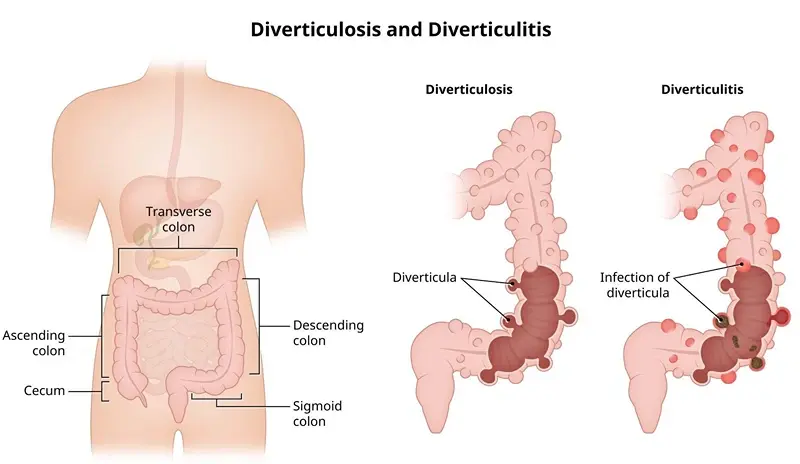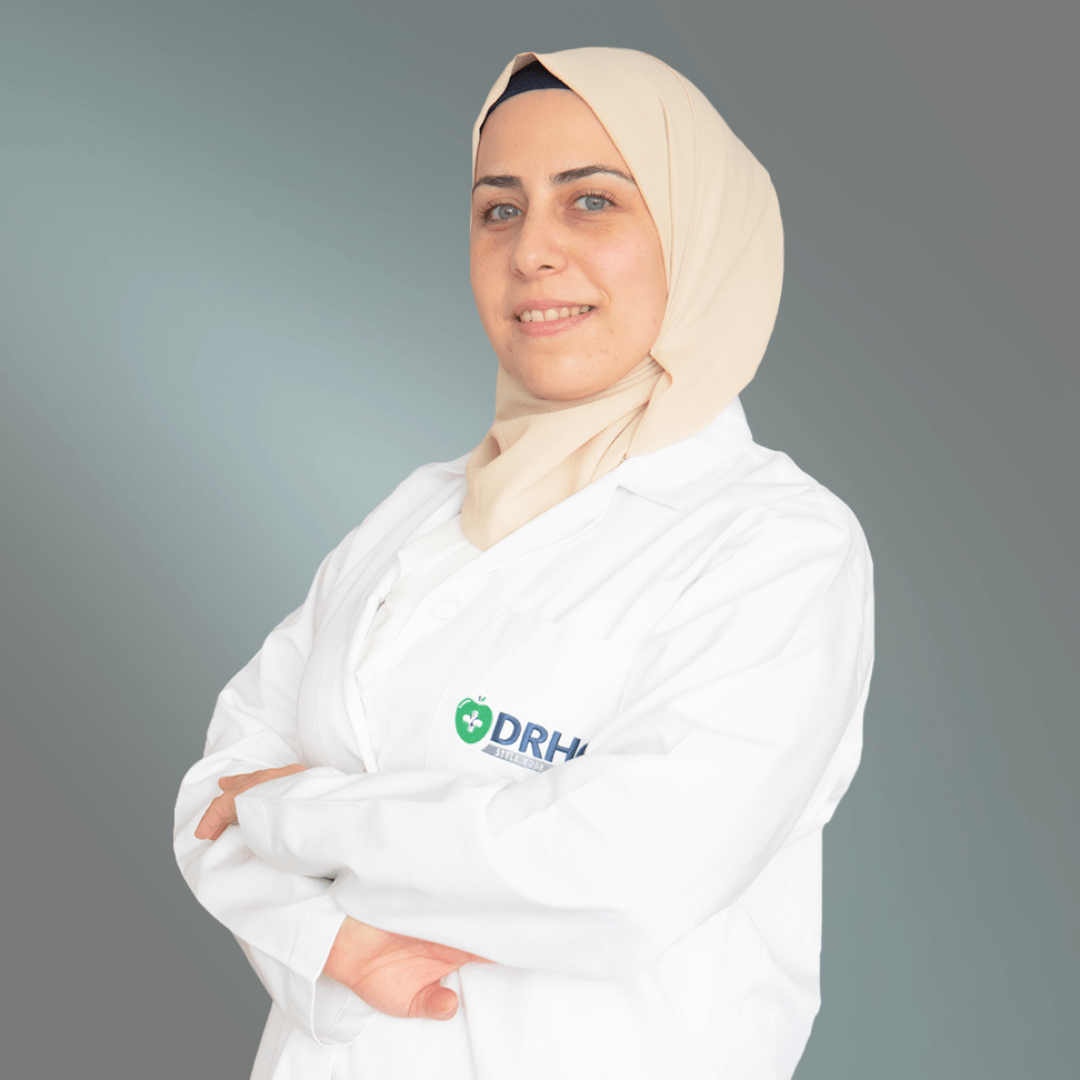Diverticulosis and Diverticulitis at DRHC Dubai
Diverticulosis and diverticulitis are conditions that affect the large intestine (colon). Diverticulosis occurs when small pouches, called diverticula, form in the walls of the colon, often as a result of pressure from constipation. In some cases, these pouches become inflamed or infected, leading to a condition called diverticulitis. At DRHC Dubai, our team of gastrointestinal specialists provides expert diagnosis, treatment, and ongoing care for both diverticulosis and diverticulitis, ensuring optimal digestive health for our patients.
What is Diverticulosis?
Diverticulosis is a condition where small, bulging pouches (diverticula) develop in the lining of the colon. It is a common condition, especially in people over the age of 40, and is often asymptomatic. Many individuals with diverticulosis may never experience symptoms, but some may develop discomfort or complications.
Causes of Diverticulosis
The exact cause of diverticulosis is not fully understood, but several factors are believed to contribute, including:
- Low-Fiber Diet: A diet low in fiber can lead to hard stools, which increases pressure on the colon, resulting in the formation of diverticula.
- Aging: As people age, the walls of the colon may weaken, making it easier for diverticula to form.
- Chronic Constipation: Straining during bowel movements due to constipation may increase the pressure on the colon, leading to the development of diverticula.
- Lack of Physical Activity: Sedentary lifestyles are linked to a higher risk of developing diverticulosis.
Symptoms of Diverticulosis
Most people with diverticulosis do not have symptoms. However, if symptoms do occur, they may include:
- Mild abdominal pain or cramping, typically on the left side
- Bloating
- Changes in bowel habits, such as constipation or diarrhea
- Mucus in the stool
Diverticulosis can be managed with lifestyle changes, but in some cases, it can progress to diverticulitis, which requires more aggressive treatment.
What is Diverticulitis?
Diverticulitis occurs when one or more diverticula become inflamed or infected, leading to more severe symptoms and potential complications. This condition requires prompt medical attention and may involve a combination of dietary changes, medications, or, in severe cases, surgery.
Causes of Diverticulitis
Diverticulitis is typically caused by a blockage in the diverticulum, leading to infection or inflammation. Factors that may contribute to diverticulitis include:
- Stool Obstruction: When stool or undigested food gets trapped in the diverticula, it can cause irritation and infection.
- Bacterial Overgrowth: Bacteria that become trapped in the diverticula can lead to infection, causing inflammation.
- Weakened Immune System: Individuals with weakened immune systems are more susceptible to developing diverticulitis.
Symptoms of Diverticulitis
Symptoms of diverticulitis are more pronounced than those of diverticulosis and can include:
- Severe Abdominal Pain: Usually felt in the lower left side of the abdomen, the pain may be constant and intense.
- Fever and Chills: Infection may cause fever and chills as the body tries to fight off the inflammation.
- Nausea and Vomiting: Some patients may experience gastrointestinal upset due to inflammation.
- Constipation or Diarrhea: Bowel habits may become irregular, with some individuals experiencing either constipation or diarrhea.
- Rectal Bleeding: In rare cases, bleeding from the rectum may occur.
Complications of Diverticulitis
If left untreated, diverticulitis can lead to serious complications, such as:
- Abscess Formation: Pockets of infection can develop within the colon.
- Perforation: A severe infection may cause the diverticulum to burst, leading to a perforation (tear) in the colon wall.
- Peritonitis: A perforated diverticulum can cause the infection to spread into the abdominal cavity, leading to a life-threatening condition called peritonitis.
- Fistula: In rare cases, a fistula (an abnormal connection between the colon and other organs) may form due to chronic inflammation.
- Bowel Obstruction: Inflammation can cause narrowing of the colon, leading to a blockage of bowel movements.
Diagnosis of Diverticulosis and Diverticulitis at DRHC Dubai
At DRHC Dubai, our gastrointestinal specialists use advanced diagnostic tools to accurately diagnose diverticulosis and diverticulitis. The diagnostic process may include:
- Medical History and Physical Examination: The doctor will assess symptoms and medical history, and perform a physical examination, particularly focusing on the abdomen.
- Colonoscopy: This procedure involves using a flexible tube with a camera to examine the inside of the colon and detect diverticula, inflammation, or infection.
- CT Scan: A CT scan may be used to confirm a diagnosis of diverticulitis and assess the severity of inflammation or complications, such as abscesses or perforations.
- Blood Tests: Blood tests may be ordered to check for signs of infection or inflammation, such as elevated white blood cell counts.
- Stool Tests: Stool tests may help rule out other conditions that cause similar symptoms, such as infections or inflammatory bowel disease.
Treatment of Diverticulosis and Diverticulitis at DRHC Dubai
1. Treatment for Diverticulosis
For individuals with asymptomatic or mild diverticulosis, treatment focuses on lifestyle changes to prevent progression and reduce the risk of developing diverticulitis:
- High-Fiber Diet: Increasing dietary fiber intake (through fruits, vegetables, and whole grains) can help soften stools and reduce pressure on the colon.
- Adequate Hydration: Drinking plenty of water helps to keep stools soft and easier to pass, preventing constipation.
- Regular Activity: Exercise promotes healthy bowel function and prevents constipation.
- Fiber Supplements: For those who cannot get enough fiber from their diet, fiber supplements may be recommended.
2. Treatment for Diverticulitis
Treatment for diverticulitis depends on the severity of the condition and whether complications have occurred:
- Mild Diverticulitis:
- Antibiotics: To treat infection and reduce inflammation.
- Dietary Changes: A temporary switch to a liquid or low-fiber diet may be recommended to allow the colon to heal.
- Pain Management: Over-the-counter pain relievers can be used to alleviate discomfort.
- Severe or Complicated Diverticulitis:
- Hospitalization: Patients with severe symptoms, abscesses, or perforations may require hospitalization for intravenous antibiotics, fluids, and close monitoring.
- Surgery: In cases where diverticulitis leads to complications such as perforation, abscesses, or bowel obstruction, surgery may be required. The surgical options include:
Resection: Removing the affected portion of the colon and reconnecting the healthy parts.
Colostomy: In some cases, a temporary or permanent colostomy may be necessary, where the colon is diverted through an opening in the abdomen to allow the bowel to heal.
Preventing Diverticulitis
Preventing diverticulitis largely involves managing diverticulosis through lifestyle modifications:
- Maintain a High-Fiber Diet: Consuming a fiber-rich diet helps prevent constipation and reduces the risk of diverticula becoming inflamed.
- Stay Hydrated: Drinking enough water aids digestion and keeps stools soft.
- Exercise Regularly: Physical activity promotes overall digestive health and prevents constipation.
- Avoid Smoking: Smoking can increase the risk of diverticulitis and other digestive disorders.
Why Choose DRHC Dubai for Diverticulosis and Diverticulitis Care?
At DRHC Dubai, we are committed to providing personalized, expert care for patients with diverticulosis and diverticulitis. Our team of highly trained specialists offers the latest diagnostic tools, effective treatment options, and comprehensive follow-up care to ensure the best outcomes for our patients. We focus on both immediate treatment and long-term management to help our patients maintain optimal digestive health.
.png?width=280&height=59&name=bookanappointment%20(1).png)
If you are due for Diverticulosis and Diverticulitis or are experiencing gastrointestinal symptoms, don't delay. Contact DRHC Dubai to schedule your appointment. Our team of experts is here to provide you with compassionate care and personalized treatment to keep your digestive health in check. To book Your Appointment, just call us at +97142798200 for consulting with the Gastroenterology Clinic at DRHC Dubai.




.png?width=280&height=59&name=bookanappointment%20(1).png)





